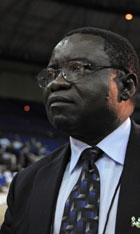
Tshibang Kasap Owan speaks in favor of additional funding for African theological education. A UMNS photo by John C. Goodwin.
Theological education in Africa is set to get a $2 million boost thanks to the 2008 General Conference of The United Methodist Church.
The assembly's 992 clergy and lay delegates from across the globe voted April 28 to expand and strengthen theological facilities beyond Africa University, as well as library development, scholarships, publications and logistical support of theological education during the next four years. The funding would become final with the approval of a churchwide budget later in the week.
According to the petition, approved 565-353 by delegates, there is a significant need for the church to support theological education across the continent because Africa represents nearly 26 percent of all United Methodists worldwide, or 3 million people. Leading these millions are 3,616 ordained elders in full connection, who represent 9.4 percent of all fully ordained United Methodist elders around the globe.
"Many times we are not aware of the realities in Africa," said Ilunga Kandolo of the North Katanga Annual (regional) Conference, in the Democratic Republic of Congo. "When you look at the incredible growth of the church in Africa, we forget that the church growth is the result of the gifted clergy we have."
Tshibang Kasap Owan, president of Katanga Methodist University in Northwest Katanga, agreed, but added that because the continent is so vast, Zimbabwe-based Africa University is not enough. "All of our students do not have opportunity to go to Africa University, so we need to support other facilities in Africa," he said.
Before the delegates passed the measure, the Rev. Charles Boayue, a delegate from the Detroit Conference, expressed support of this initiative because Africa is a fast-growing part of the denomination. He encouraged the delegates to "not allow our budgetary constraints to be the only measure for how we treat this great need."
The $2 million approved by the delegates is not final until the churchwide Council on Finance and Administration and the Connectional Table present a quadrennial budget to the 2008 General Conference for approval.
*Green is a United Methodist News Service news writer based in Nashville, Tenn.
News media contact: Linda Green, e-mail: [email protected].
Phone calls can be made to the General Conference Newsroom in Fort Worth, Texas, at (817) 698-4405 (817) 698-4405 until May 3. Afterward, call United Methodist News Service in Nashville, Tenn., at (615) 742-5470
(817) 698-4405 until May 3. Afterward, call United Methodist News Service in Nashville, Tenn., at (615) 742-5470 (615) 742-5470.
(615) 742-5470.
Related Article
General Conference headlines
Resource
Like what you're reading? Support the ministry of UM News! Your support ensures the latest denominational news, dynamic stories and informative articles will continue to connect our global community. Make a tax-deductible donation at ResourceUMC.org/GiveUMCom.



